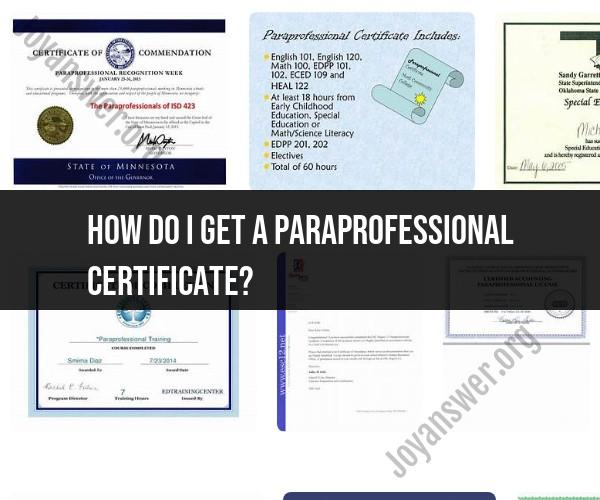How do I get a paraprofessional certificate?
The requirements for obtaining a paraprofessional certificate can vary by state and educational institution. However, here are general steps you can follow to pursue a paraprofessional certificate:
Check State Requirements: Start by researching the specific requirements for paraprofessional certification in your state. Each state may have its own regulations and requirements, including education and training criteria.
Educational Requirements:
- Many states require a high school diploma or equivalent as a minimum educational requirement. Some may require completion of a specific number of college credits or an associate's degree.
Training and Work Experience:
- Some states may require completion of a paraprofessional training program or a specified number of hours of supervised work experience in an educational setting.
Background Check: You may need to undergo a criminal background check or fingerprinting to ensure your suitability for working with students.
Passing an Exam: In some states, you may be required to pass a standardized paraprofessional assessment exam. This exam typically assesses your knowledge and skills in areas related to assisting in the classroom.
Apply for Certification: Submit an application for paraprofessional certification to your state's education department or the appropriate regulatory agency. Be prepared to provide documentation of your educational qualifications, training, and any exam scores.
Pay Application Fees: There may be application fees associated with obtaining a paraprofessional certificate. Check with your state's education department for fee details.
Complete Continuing Education: Some states may require you to engage in ongoing professional development or continuing education to maintain your paraprofessional certification.
Receive Certification: Once your application is approved, you will receive your paraprofessional certificate, which may be valid for a specific period. Be sure to keep track of the expiration date and any renewal requirements.
Seek Employment: With your paraprofessional certificate in hand, you can start looking for employment opportunities in educational settings, such as public schools, private schools, special education programs, and preschools.
Remember that the specific requirements and procedures for paraprofessional certification can vary, so it's crucial to consult your state's education department or a relevant certifying authority for the most accurate and up-to-date information. Additionally, some school districts and employers may have their own requirements or preferences for paraprofessional qualifications, so it's advisable to research local job postings and speak with potential employers to understand their specific requirements.
Achieving Paraprofessional Certification: Your Guide to the Process
Paraprofessional certification is a credential that demonstrates that a paraprofessional has the skills and knowledge necessary to be successful in their role. Certification is not required in all states, but it is highly recommended.
The process for achieving paraprofessional certification varies from state to state. However, there are some general steps that you can follow:
- Meet the education requirements. Most states require paraprofessionals to have a high school diploma or GED. Some states may also require paraprofessionals to have completed some college coursework or to have an associate's degree.
- Pass a competency exam. Most states require paraprofessionals to pass a competency exam in order to be certified. This exam typically covers topics such as reading, writing, math, and child development.
- Complete a background check. Most states require paraprofessionals to complete a background check before they can be certified. This background check is typically used to identify any criminal convictions or other red flags.
Once you have met all of the requirements for certification, you will be issued a certificate by your state's education department. This certificate will be valid for a certain period of time, typically three to five years. After that time, you will need to renew your certification in order to continue working as a paraprofessional.
Becoming a Paraprofessional: Steps to Obtain Certification
Here are some additional tips for obtaining paraprofessional certification:
- Start early. The process of obtaining certification can take several months, so it is important to start planning early.
- Research the requirements in your state. The requirements for paraprofessional certification vary from state to state. Be sure to research the requirements in your state so that you can make sure that you meet all of the criteria.
- Prepare for the competency exam. There are a number of resources available to help you prepare for the paraprofessional competency exam. You can find study guides, practice tests, and other resources online and at your local library.
- Network with other paraprofessionals. Talking to other paraprofessionals can be a great way to learn about the certification process and to get tips for success.
Paraprofessional Credentials: Navigating the Certification Journey
Achieving paraprofessional certification is a valuable step in your career journey. Certification demonstrates that you have the skills and knowledge necessary to be successful as a paraprofessional. It also shows that you are committed to your profession and to providing the best possible support to students.
If you are interested in becoming a paraprofessional, I encourage you to start learning about the certification process today. There are many resources available to help you succeed.











